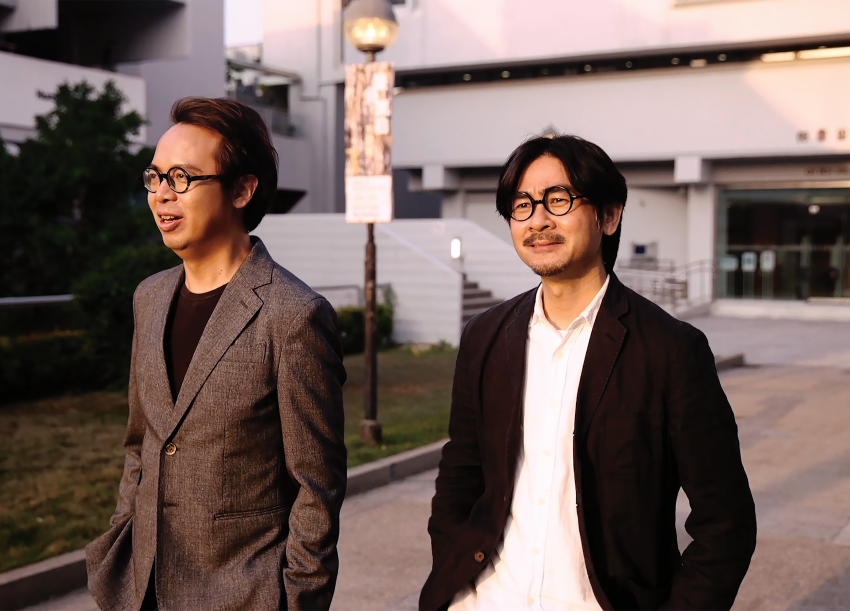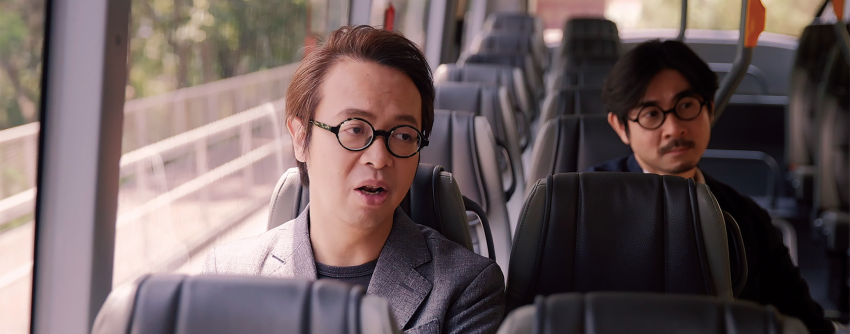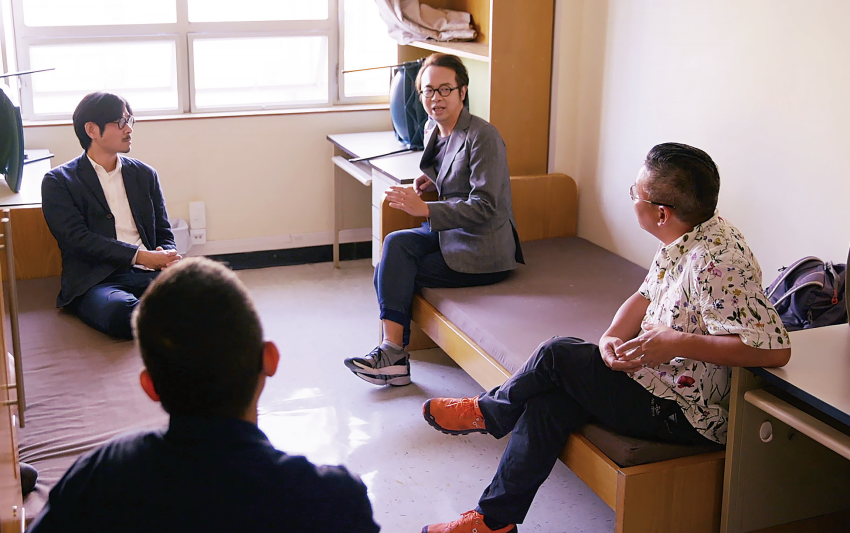



Read our students' stories that start from the CUHK and go further beyond.
“Stay hopeful, even when all we have left is the purpose we've never forgotten.”
「仍然要寄望,唯有初衷,我未忘」

Programme: We are CUHKers II 我們都是中大人 II
On a hilltop at CUHK, there is a male hostel nestled in between a canopy of trees. It has a meaningful name - Chih Hsing Hall, which literally translates as “knowledge and conduct”. On one midsummer’s day some years ago, Adam Wong and Saville Chan, walked onto the campus of New Asia College, each with a suitcase in their hand and dreams in their heart. This place was where the duo’s youthful memories were made, and where they learnt to live by the New Asia’s spirit as encapsulated in one line of the College anthem, “Seize one’s youth and walk hand in hand”.
One thing Adam and Saville love about their alma mater is that the teachers there never set rigid rules for students to follow. In those years, the two free-spirited young men regarded CUHK as the cradle of their dreams. Having had a lot more life experiences now, they see the University as a place for them to rediscover their aspirations.
At CUHK, there were countless nights when Adam and Saville, together with a third dormmate, talked about everything from social issues to their movie-making dreams. Saville recalls, “Anthropology exposed us to different social and cultural issues. That made me ask many questions and think a lot, which was why I often had discussions with Adam. University students have the responsibility to ponder what we observe in society.” The way Saville brought anthropological discussions into his daily life exemplifies how learning is never limited to the classroom.

While Saville learnt the true meaning of university education, Adam also recognised his profound connection with the Hong Kong identity during his university years. He says, “It wasn’t until I joined an exchange programme in the USA that I realised that most of the things I liked in life were all related to Hong Kong. When I learnt that Hong Kong movies were actually very impactful abroad, it dawned on me these movies were really spectacular and unique.” Discovering his passion for Hong Kong, Adam tried to find a way to express it. He and Saville wanted to make films, and they have stayed true to their passion. Years after graduation, they made the movies The Way We Dance and She Remembers, He Forgets. The pure pursuit of dreams as told in the two stories has touched many people.
“‘There is nothing new under the sun, but plenty exists in the shadows.’ Shadows are easily neglected. When people observe things around them, they tend to focus on the superficial appearance and ignore the shadows that make the objects they observe three-dimensional.” This remark, made by Professor Kurt Chan, Adjunct Professor at CUHK’s Department of Fine Arts, has stuck in Adam’s mind for years, inspiring him to use movies to explore the “shadows” of things from different perspectives. Another thing from the university days that has been etched into Adam’s mind is a question posed by Saville during a chat one evening. “What is culture?” asked Saville. The question still stays in Adam’s mind. He also remembers the answer given by Professor Sidney Cheung from the Department of Anthropology, “Culture is our way of living. It is about having a thorough understanding of life and reflecting on what shapes our decisions.”
In retrospect, Adam and Saville realise the few years at CUHK had taught them how to interpret cultural elements and the world. Their ideas that were once compressed into lengthy essays and drawings on their sketchbooks have evolved into dialogues and scenes in their movies.
At CUHK, anthropology lectures are usually held in Humanities Building, and Fine Arts classes in Cheng Ming Building (“Cheng” stands for “sincerity”; “Ming” stands for “intelligence”). As students of New Asia College, Adam and Saville learnt from day one the College philosophy: the most ideal scenario is for one to pursue both knowledge and a moral character, and with the utmost sincerity comes the brightest virtue.
This ideal has always been in the back of their mind all these years, and it has been incorporated into their artistic productions. It has been more than two decades since they walked out of Chih Hsing Hall, but their passion has not been overpowered by reality, and they remain committed to telling authentic local stories through their films. The key? Perhaps one can find inspiration from the lyrics Saville wrote for the theme song of She Remembers, He Forgets, “Stay hopeful, even when all is left is the purpose, that we will not forget.” These words of hope may as well be a heartfelt message for today’s youths.

在山城之巔,綠蔭之間站著一座男子宿舍,名字很有意思,叫做「知行樓」。那年盛夏,黃修平和陳心遙拉著行李箱,心中抱著夢想,走進新亞書院的校園,就如新亞校歌道「趁青春,結隊向前行」,在知行樓度過青蔥歲月。
在大學,師長從不為年輕學人畫下方圓,對於嚮往自由的黃修平和陳心遙來說,中大正是夢想的搖籃;經歷多年滾滾紅塵後,這裏亦是個重探初心的地方。多少個晚上,二人在房間與室友仨談社會、談理想,築起拍電影的夢。「讀人類學會接觸很多社會和文化議題,自然會常常與修平討論。大學生,對社會有思考問題是應該的。」求學不限於書本與課堂,陳心遙將人類學的課題帶回宿舍,與黃修平談個天荒地老。「發現自己喜歡的事情都是和香港有關的,第一次是在美國當交換生的那年,回望香港電影的影響力,才知香港電影的厲害及獨特之處。」修平發掘了自己對香港的鍾愛,想將之實現。黃修平和陳心遙以拍攝電影為當初的理想,沒有埋沒初心的他們,畢業多年後攜手完成《狂舞派》、《那一天我們會飛》,那種純粹、對夢想的追尋與回望,引起了很多觀眾的共鳴。
「『陽光底下無新事,許多存在影子中。』影子永遠依附物件,人們觀察身邊的事物時,往往只了解物件片面的外貌,忽略了令物件顯得立體的影子。」藝術系客席教授陳育強這一席話,黃修平一直記於胸臆之中,希望透過電影從不同角度探索事物的「影子」。陳心遙憶起昔日求學的日子,修讀人類學的他雖然沒有跟黃修平一樣鑽研藝術,卻不放過這位室友,一天晚上問黃修平:「甚麼是文化?」這一問至今黃修平仍牢牢記住。人類學系的張展鴻教授下了這樣的定義:「文化就是生活。透徹地了解生活,反思甚麼影響我們作出不同選擇,這就是文化。」
人類學上課的地方名叫「人文館」,而藝術系則是「誠明館」。「求學與作人,貴能齊頭並進」,至誠而有明德。黃修平和陳心遙離開了新亞校園,將人文精神彰顯於他們的電影之中,距離當初於知行樓的年輕歲月已有二十多年,他們的熱誠沒有被現實的洪流撲熄,繼續以電影道出本土的故事。「仍然要寄望,唯有初衷,我未忘」,這是陳心遙為電影《哪一天我們會飛》寫下的歌詞,彷彿是對這時代年輕人的寄語。



